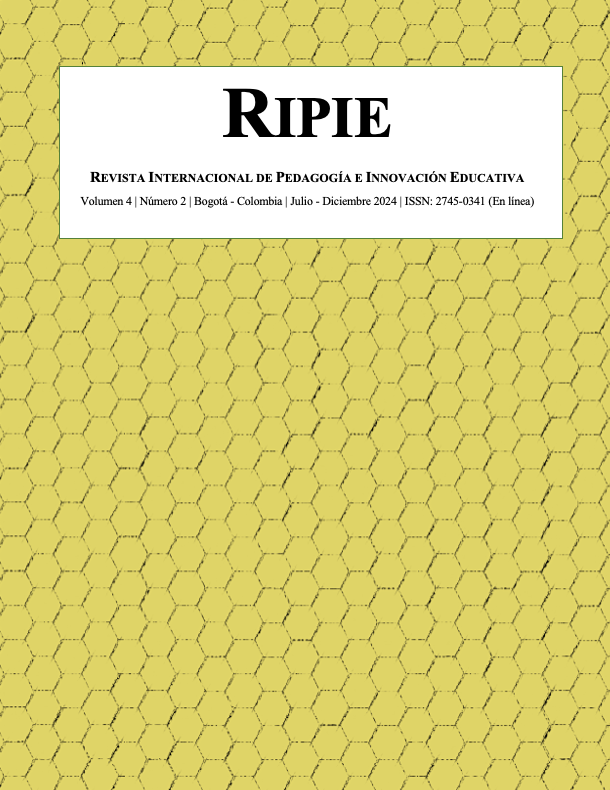Educational innovation with adaptive learning systems powered by Artificial Intelligence
DOI:
https://doi.org/10.51660/ripie42222Keywords:
educational innovation, adaptive learning, artificial intelligence, personalizationAbstract
The emergence of artificial intelligence (AI) is transforming education through adaptive learning systems. These systems, based on AI algorithms, personalize the educational experience by adjusting to the needs and learning styles of each student. Using techniques such as machine learning and deep learning, they analyze large volumes of data to generate personalized learning itineraries, breaking with the homogeneous teaching model. Their implementation requires a suitable technological platform, a solid data infrastructure and the training of teachers in the use of these tools. The benefits are multiple: students receive real-time feedback and progress at their own pace, improving their motivation and learning effectiveness, while teachers can focus their efforts on higher value-added tasks and obtain valuable information on their students' progress, facilitating adaptive and personalized teaching.
Downloads
References
Alfredo, R., Echeverria, V., Jin, Y., Yan, L., Swiecki, Z., Gašević, D., & Martinez-Maldonado, R. (2024). Human-centred learning analytics and AI in education: A systematic literature review. Computers and Education: Artificial Intelligence, 6. https://doi.org/10.1016/j.caeai.2024.100215
Alrawashdeh, G. S., Fyffe, S., Azevedo, R. F. L., & Castillo, N. M. (2024). Exploring the impact of personalized and adaptive learning technologies on reading literacy: A global meta-analysis. Educational Research Review, 42. https://doi.org/10.1016/j.edurev.2023.100587
Amini, H., Alanne, K., & Kosonen, R. (2024). Building simulation in adaptive training of machine learning models. Automation in Construction, 165. https://doi.org/10.1016/j.autcon.2024.105564
Aparicio Gómez, O. Y., Ostos Ortiz, O. L., & Mesa Angulo, J. G. (2022). La convergencia de aprendizajes en el metaverso. Revista Interamericana de Investigación Educación y Pedagogía RIIEP, 15(2), 385–398. https://doi.org/10.15332/25005421.7879
Aparicio-Gómez, O.-Y., & Aparicio-Gómez, W.-O. (2021). Referentes filosóficos del proceso educativo. Revista Internacional de Filosofía Teórica y Práctica, 1(2), 157–168. https://doi.org/10.51660/riftp.v1i2.37
Costa, A., Silva, F., & Moreira, J. J. (2024). Towards an AI-Driven User Interface Design for Web Applications. Procedia Computer Science, 237, 179–186. https://doi.org/10.1016/j.procs.2024.05.094
Han, J., Liu, G., Liu, X., Yang, Y., Quan, W., & Chen, Y. (2024). Continue using or gathering dust? A mixed method research on the factors influencing the continuous use intention for an AI-powered adaptive learning system for rural middle school students. Heliyon, 10(12). https://doi.org/10.1016/j.heliyon.2024.e33251
Ipinnaiye, O., & Risquez, A. (2024). Exploring adaptive learning, learner-content interaction and student performance in undergraduate economics classes. Computers and Education, 215. https://doi.org/10.1016/j.compedu.2024.105047
Kang, G., Seong, H., Lee, D., & Shim, D. H. (2024). A versatile door opening system with mobile manipulator through adaptive position-force control and reinforcement learning. Robotics and Autonomous Systems, 104760. https://doi.org/10.1016/j.robot.2024.104760
Khan, A. E., Hasan, M. J., Anjum, H., Mohammed, N., & Momen, S. (2024). Predicting life satisfaction using machine learning and explainable AI. Heliyon, 10(10). https://doi.org/10.1016/j.heliyon.2024.e31158
Mwambe, O. O. (2024). Deployment of information processing theory to support adaptive e-learning systems: Feasibility study. Computers in Human Behavior Reports, 14. https://doi.org/10.1016/j.chbr.2024.100420
Naseer, F., Khan, M. N., Tahir, M., Addas, A., & Aejaz, S. M. H. (2024). Integrating deep learning techniques for personalized learning pathways in higher education. Heliyon, 10(11). https://doi.org/10.1016/j.heliyon.2024.e32628
Ouyang, F., & Zhang, L. (2024). AI-driven learning analytics applications and tools in computer-supported collaborative learning: A systematic review. Educational Research Review, 44. https://doi.org/10.1016/j.edurev.2024.100616
Pahi, K., Hawlader, S., Hicks, E., Zaman, A., & Phan, V. (2024). Enhancing active learning through collaboration between human teachers and generative AI. Computers and Education Open, 6, 100183. https://doi.org/10.1016/j.caeo.2024.100183
Pan, S., Hafez, B., Iskandar, A., & Ming, Z. (2024). Integrating constructivist principles in an adaptive hybrid learning system for developing social entrepreneurship education among college students. Learning and Motivation, 87, 102023. https://doi.org/10.1016/J.LMOT.2024.102023
Sharma, A., & Singh, U. K. (2022a). Modelling of smart risk assessment approach for cloud computing environment using AI & supervised machine learning algorithms. Global Transitions Proceedings, 3(1), 243–250. https://doi.org/10.1016/j.gltp.2022.03.030
Sharma, A., & Singh, U. K. (2022b). Modelling of smart risk assessment approach for cloud computing environment using AI & supervised machine learning algorithms. Global Transitions Proceedings, 3(1), 243–250. https://doi.org/10.1016/j.gltp.2022.03.030
Shoaib, M., Sayed, N., Singh, J., Shafi, J., Khan, S., & Ali, F. (2024). AI student success predictor: Enhancing personalized learning in campus management systems. Computers in Human Behavior, 158. https://doi.org/10.1016/j.chb.2024.108301
Song, Y., Weisberg, L. R., Zhang, S., Tian, X., Boyer, K. E., & Israel, M. (2024). A framework for inclusive AI learning design for diverse learners. Computers and Education: Artificial Intelligence, 6. https://doi.org/10.1016/j.caeai.2024.100212
Tebenkov, E., & Prokhorov, I. (2021). Machine learning algorithms for teaching AI chat bots. Procedia Computer Science, 190, 735–744. https://doi.org/10.1016/j.procs.2021.06.086
Teke, A., & Kavzoglu, T. (2024). Exploring the decision-making process of ensemble learning algorithms in landslide susceptibility mapping: Insights from local and global explainable AI analyses. Advances in Space Research. https://doi.org/10.1016/j.asr.2024.06.082
Variant Anna, N. E. (2024). AI/ Machine Learning for Cataloguing, Classification, and Indexing. Reference Module in Social Sciences. https://doi.org/10.1016/B978-0-323-95689-5.00131-0
Zheng, W. (2024). Intelligent e-learning design for art courses based on adaptive learning algorithms and artificial intelligence. Entertainment Computing, 50. https://doi.org/10.1016/j.entcom.2024.100713
Downloads
Published
Issue
Section
License
Copyright (c) 2024 Revista Internacional de Pedagogía e Innovación Educativa

This work is licensed under a Creative Commons Attribution-NonCommercial-ShareAlike 4.0 International License.
Articles are published under the terms of a licence that permits use, distribution and reproduction in any medium, provided that the original work is properly cited. Ed&TIC retains the proprietary rights to the published works and actively promotes the reuse of these works under the terms of the aforementioned licence, which encourages the dissemination of knowledge and collaboration in the academic community.


